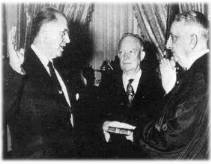 a·pos·tle ·trump ·card – logical fallacy : a logical fallacy referring to attempts to end political discussion by quoting a general authority.
a·pos·tle ·trump ·card – logical fallacy : a logical fallacy referring to attempts to end political discussion by quoting a general authority.
When debating in Mormon circles, many feel that one can’t disagree with a political statement by an apostle. To them, doing so would clearly indicate drifting or even apostasy from the principles of the Church. This kind of thinking is both unproductive and inaccurate because it assumes that there is no political disagreement among the Brethren and that your apostle of choice speaks for the church on political matters. This is simply not true. Nonetheless, the apostle trump card is often played in debates across the Mormon world—especially by conservatives. I will illustrate the problem using the most common example: Ezra Taft Benson.
President Benson was an incredible apostle and prophet—certainly called of God. He did great things for the Church and our country, serving under Eisenhower as Secretary of Agriculture. He had great love for the Constitution and great fear of communism. Benson’s conservatism makes him a popular trump card among conservatives who use him as a means of substantiating their views on entitlements and other issues, assuming that Benson’s political statements establish the will of God on these matters. In their minds, the fact that Benson shares their views closes the door on discussion entirely, stifling responsible thought and discussion about political issues. This tendency can sometimes be perceived as self-righteousness, and it shows a general lack of knowledge about a complex time in Church history—the apostles did disagree on political matters.
In the late 1950s, Benson began a close association with the leaders of the John Birch Society, an anti-communist organization that many considered extremist. Despite Benson’s persistent involvement with the Birchers, President McKay disagreed with many of their viewpoints and never allowed Benson to join this society. There was also much disagreement among the apostles regarding Benson’s views on communism. During the 1960s, Benson delivered anti-communist speeches, including in them statements about the relationship between socialism and communism and the dangers of anything like unto them. These statements concerned many Church members, including the apostles and even the counselors in McKay’s First Presidency: Hugh B. Brown and N. Eldon Tanner, both Democrats. Brown was also concerned about the dangers of communism, but he and others felt that Benson’s controversial remarks and accusations (he had supported Joseph McCarthy) were not the best ways to fight the problem. Public views of the association between the Birchers and the Church, largely due to Benson’s support of their politics, led the First Presidency to issue a statement that read in part, “We deplore the presumption of some politicians, especially officers, co-ordinators [sic] and members of the John Birch Society, who undertake to align the Church or its leadership with their partisan views.”
In 1968, Benson made plans with Senator Strom Thurmond (yes, that Strom Thurmond) to form a third party and run for president. Benson and Thurmond were in opposition to the civil rights movement—Thurmond due to racism, and Benson due to a belief that the movement was a communist conspiracy. This concerned many of the Brethren, and McKay asked that Benson not participate. The relationship among the Brethren regarding Benson’s politics can be best explained by another anecdote: in 1969, Benson gave a controversial speech at BYU, criticizing the government and international officials for being liberal. Shortly after, McKay authorized Brown to give a rebuttal speech.
In general, many Church leaders disagreed with Benson’s politics. In a letter to Senator Ralph Harding, the conservative Joseph Fielding Smith said, “I hope [Benson] will get all of the political notions out of his system.” McKay told Harding, “Several of us have had problems with Brother Benson over the Birch Society.” After McKay’s death, Benson’s political statements ceased. “McKay was succeeded by Joseph Fielding Smith and, subsequently, Harold B. Lee, both of whom had strongly objected to Benson’s political activities during McKay’s presidency,” wrote McKay’s biographers Prince and Wright.
The lesson of this story is that Elder Benson did not represent the views of the Church. Rather, many of the apostles disagreed with him much of the time. In a political discussion, quoting Benson’s views on politics and assuming the debate is over is misleading because there is an allowance for difference of opinion even among the Brethren. Despite statements by Benson, the Church has repeatedly expressed its position that members in good standing can be involved in either of America’s political parties. There is a difference between personal values and political pragmatism. The political views of the Brethren are certainly relevant, but because the Brethren have often disagreed, these political views should not be considered the final word—and they don’t exempt conservatives from needing to develop solid arguments for their views. Most importantly, using the apostle trump card to attack the character of political opponents is damaging and ignorant. Educated members of the church can and should base arguments on reason and facts instead of relying on the apostle trump card.

Continue reading at the original source →



